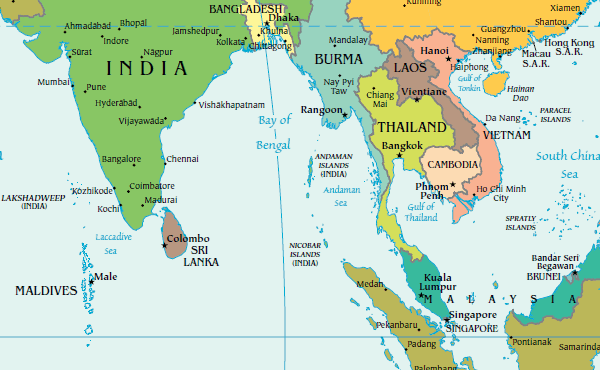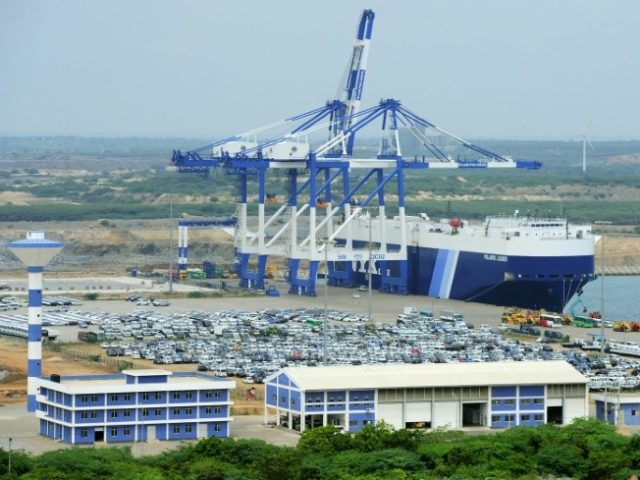This morning’s key headlines from GenerationalDynamics.com
- Sri Lanka constitutional crisis grows as president dissolves parliament
- New Maldives government begins untangling previous government’s secret deals with China
Sri Lanka constitutional crisis grows as president dissolves parliament

A poster in Colombo, Sri Lanka, shows Mahinda Rajapaksa, left, with President Maithripala Sirisena (Reuters)
There are major individual government crises in progress in both the Maldives and Sri Lanka, and they are linked by China’s interference in the affairs of both countries by using “debt trap diplomacy” related to the Belt and Road Initiative (BRI).
Sri Lanka’s president Maithripala Sirisena dissolved parliament on Friday after his administration promised that he would not do that. Sirisena fired Prime Minister Ranil Wickremesinghe on October 26 and appointed a new Prime Minister Mahinda Rajapaksa.
Sirisena wanted the parliament to confirm his actions, but after it became clear that he would not have the votes, he dissolved parliament to prevent a vote.
An interesting angle is that the Tamil MPs specifically refused Sirisena’s request that they abstain from the vote. The ethnic Hindu Tamil minority community was defeated in a generational crisis civil war that climaxed in 2009, with Rajapaksa leading the ethnic Buddhist Sinhalese majority to victory, amid charges of war crimes.
So rather than allow a vote, Sirisena dissolved the parliament and called for snap elections in January. Sirisena’s opponents are saying that both the decision to fire the prime minister and the decision to dissolve the parliament are unconstitutional. So the constitutional crisis and government gridlock are expected to continue into the new year.
Sirisena has never given any explanation for why he fired his prime minister Ranil Wickremesinghe. It is now emerged that Sirisena were in sharp disagreement over whether a seaport project in the country capital Colombo should be awarded to a Chinese firm, favored by Sirisena, or an Indian firm, favored by Wickremesinghe. Wickremesinghe was fired just after that loud disagreement, and Rajapaksa was appointed.
Rajapaksa has always had close relations with China. When Rajapaksa was president, he signed the agreement with China to build the Hambantota seaport. This was China’s first major “debt trap” deal, putting Sri Lanka into so much debt that it had to hand control of the seaport over to China.
Today, Sri Lanka is still in so much debt that it will never be paid back. Still, because of Sri Lanka’s strategic importance, both India and China want to build the new infrastructure projects. The constitutional crisis may appear to be a domestic matter, but it has important geopolitical implication. Times of Sri Lanka and Reuters and Channel News Asia
New Maldives government begins untangling previous government’s secret deals with China

Map showing strategic location of Maldives and Sri Lanka in the Indian Ocean
At the time I wrote about the September 23 Maldives election, it seemed the country could be headed for its own constitutional crisis. The country was in something of a state of shock because the incumbent president Abdulla Yameen, who had never hesitated to use vote-rigging or jailings or violence to win elections, had been expected to win. Instead, his opponent, Ibrahim Mohamed Solih, won decisively, by 58-41 percent of the vote.
It was suspected that Yameen could not step down since a new administration would discover massive corruption in Yameen’s dealings with China. China had arranged for a “debt trap” for Maldives, and Yameen’s family was heavily involved in China’s infrastructure projects in the five years Yameen was in power. As usual, the contractual specifics between the Maldives and China were completely secret. In other countries where situations like this have occurred, the leader and his family are often so heavily involved in bribery and corruption that they dare not lose power.
So it was feared that Yameen would use whatever tactics and power he could to overturn the election, but it seems that he was unable to do so because Solih’s win was so huge.
The first thing Solih did after winning the elect was to meet with the Chinese ambassador, where he learned that the Maldives owed the Chinese $3 billion, not the $1.5 billion he had previously been told. That is more revenue than Maldives’ government raises in two years – a staggering figure that makes the Maldives a prime example of how Chinese loans have swamped smaller economies with loans that can’t be repaid.
Details of the debt – and how much might have been stolen – will only begin to emerge after Solih takes office on November 17 and his aides gain complete access to documents Yameen’s government hid from lawmakers and the public. But information already collected by Solih’s transition team indicates the liabilities are greater than initially believed and will soon outpace the country’s ability to pay.
It is amazing how China has gotten away with “debt trap diplomacy” in country after country. They loan a country to build infrastructure proects that will strategically benefit China and only marginally benefit the local population. They require that the loan money be used to purchase parts and services from Chinese firms and that almost all workers must be Chinese. So instead of benefiting the local factories and workers, the money goes back to China to benefit factories and people there. And then the country still has to repay the loan, which means that they’re repaying the loan twice.
At this point, China’s “debt trap diplomacy” has gotten so much publicity that many countries are now cutting back on Belt and Road Initiative (BRI) projects. Both Malaysia and Pakistan have recently cut back or canceled BRI projects. The latest is Sierra Leone, which has accumulated more than $220 million in Chinese debt, and last month canceled a new airport project with Chinese labor and loans.
In the Maldives, Solih has promised to examine all contracts and leases to see which should be cut back or modified. Because the Maldives and Sri Lanka are both so strategically important and are both in the Indian Ocean just off the southern tip of India, both India and China have similar interests in South China Morning Post and National Herald India and Reuters (11-Oct) and Standard Times Press (Sierra Leone)
Related Articles:
- Sri Lanka constitutional crisis represents opportunity for China (31-Oct-2018)
- China takes control of strategic Hambantota seaport in Sri Lanka, raising concerns in India (11-Dec-2017)
- Report: Sri Lankan government repeatedly torturing and raping Tamils (14-Jan-2016)
- Maldives crisis pits India vs China in the Indian Ocean (07-Feb-2018)
- Maldives in crisis as China-backed incumbent president Yameen loses election (24-Sep-2018)
KEYS: Generational Dynamics, Sri Lanka, Maithripala Sirisena, Ranil Wickremesinghe, Mahinda Rajapaksa, India, Hambantota port, China, Belt and Road Initiative, BRI, Maldives, Abdulla Yameen, Ibrahim Mohamed Solih, Malaysia, Pakistan, Sierra Leone
Permanent web link to this article
Receive daily World View columns by e-mail

COMMENTS
Please let us know if you're having issues with commenting.